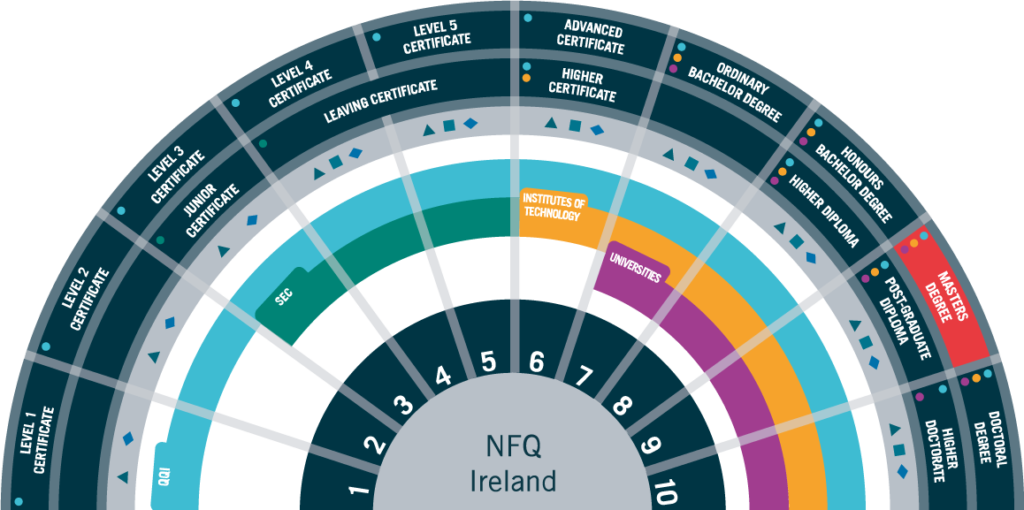If you have decided to do an accredited course, one of the first things you’ll need to know is where the qualification falls of the NFQ. The NFQ – the National Framework of Qualifications – has ten levels. The more difficult or specialised a course, the higher the level. Your Junior Cert is falls at Level 3; if you were to do a PhD, that’s a Level 10 award.
Let’s have a brief look at the ten levels.
Level 1 and 2 Awards
These awards cover basic literacy and numeracy. They are used for a wide range of people, including the young, the old, and people with intellectual or other disabilities. Adults returning to training, or learners with few or no previous qualifications may also study for Level 1 awards.
Level 3 Awards
This award recognises knowledge, as well as personal and practical skills, including some transferable skills.
Junior Certificate
In order to receive Junior Certificate, students must pass their examinations from first three years of secondary school. Most students return to school to do the Leaving Certificate.
Level 4 Award
The Level 4 award is for vocational and personal skills. In addition, this certificate means the recipient has a specific standard of knowledge and understanding.
Level 5 Award
This certificate is vocationally specific. It also means the recipient has acquired a general theoretical understanding of a field of work. Anyone with a Level 5 can start working or apply for further study programmes.
Leaving Certificate
The Leaving Certificate falls at NFQ Levels 4 and 5.
Level 6: Advanced Certificate
Advanced Certificate programmes teach a comprehensive range of skills. Some are specific to a particular vocation. Students develop a detailed theoretical understanding as well as vocational and occupational skills.
Level 6: Higher Certificate
A Level 6 Higher Certificate takes about two years to complete. School leavers, or anyone with an equivalent qualification, can apply.
Level 7: Ordinary Bachelor Degree
An Ordinary Bachelor Degree takes, on average, three years. You need a Leaving Certificate or its equivalent to apply. However, if you have a Higher Certificate, you may be able to transfer or do a one-year programme to get an Ordinary Bachelor Degree.
Level 8: Honours Bachelor Degree
The Honours Bachelor Degree generally takes three to four years to complete. Some courses, like architecture and medicine take longer. There are also several one-year programmes for people with an Ordinary Bachelor Degree to obtain an Honours Bachelor Degrees.
Level 8: Higher Diploma
A Higher Diploma takes a year to complete. Generally speaking, you need an Honours Bachelor Degrees to do a Higher Diploma. Students generally do the Higher Diploma when they switch to a different field of study from their Honours Bachelor Degree.
Level 9: Postgraduate Diploma
It generally takes a year to do the Postgraduate Diploma. It is an intermediate qualification.Applicants normally have an Honours Bachelor Degree, but if you have an Ordinary Bachelor Degrees you can also apply.
Level 9: Master’s
There are taught as well as research Master’s Degrees in Ireland. Firstly, the taught Master’s takes one to two years of study. Most students have Honours Bachelor Degrees. Most Research Master’s Degree programmes last two years.
Level 10: Doctorate
Depending on the discipline, you will need an Honours Bachelor Degree or Master’s Degree before you can begin a PhD. Most Doctoral programmes take three and four years to complete.
Level 10: Higher Doctorate
Finally, the High Doctorate is for career progression to advanced levels of academia and research. This award recognises the recipient’s contributions to the body of knowledge.












Hi I completed a diploma in retail management course through musgraves distance learning over a part time 3 yr period and I was wondering what level this course qualifies under
Hello Caroline,
You’d have to get that clarified by the training provider. I’d give them a call and check. You can get them via +353 (0) 21 4803000. It’s well worth getting in contact!
All the best,
Gemma
Hi, I am a foreign and I cannot proof my education from my country. How can I get level 1 and 2 certificate for the start? With pleasure will go for any exam but cannot find anything.
Thank you.
Anna
Hi I am wondering what a degree diploma over 2 years in a university in health and safety equals in levels in the NQI.
Thanks.
Hi
Hoping you can help.
I completed a certificate of business studies in DKIT in 1989_1991.
Is this qualification still valid?
Would it still allow me to start a course at level 6?
Many thanks
Julie
I would like to know more about course in level 8.
Hello, I am interested in doing a level 7 course please advise
I completed a Diploma in Health Promotion in NUIG in 1997, one year full time
Wondering what level award this course was?
Hello could you please tell me what is the NVQ level 1 (UK) equivalent in NFQ levels please.
Thank You.
Hi,
What 1 year courses are available to bring the level 7 Ordinary Batchelors to the level 8 Honours Bachelors and is it subject specific to the subject at ordinary level. Not sure if my degree course still runs, was a while ago.
Thank you,
Please how can I apply for a level six class
Hi this could be the wrong thread to make the comment but can someone please clarify
Would a Uk Bachelor of Arts degree in Ireland be classed as level 7 ordinary degree or same as Uk which is level 6?
Very good